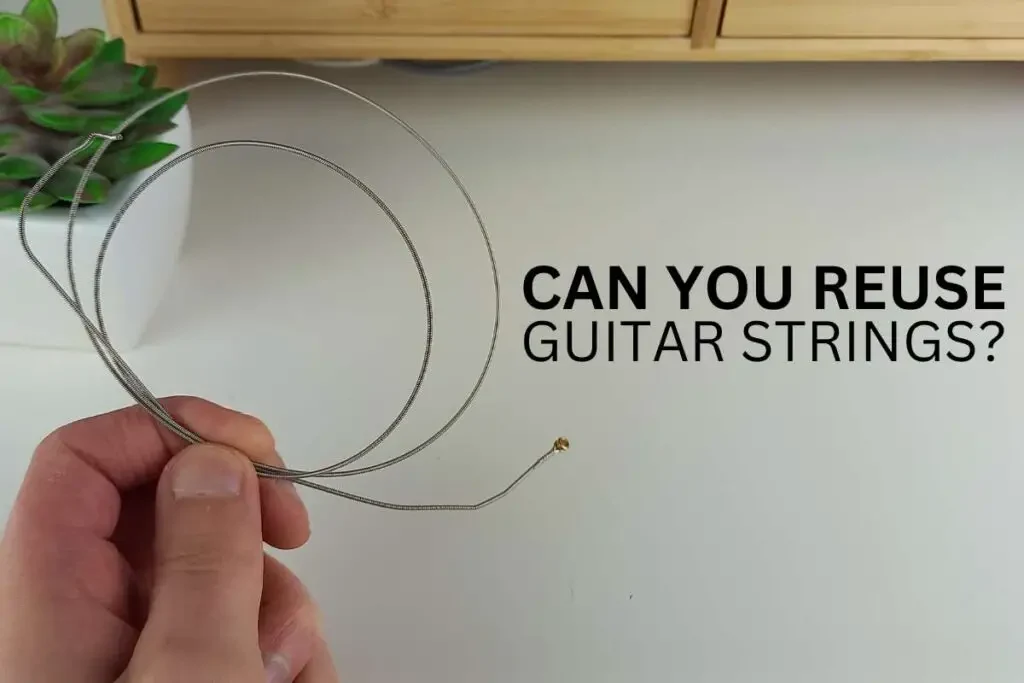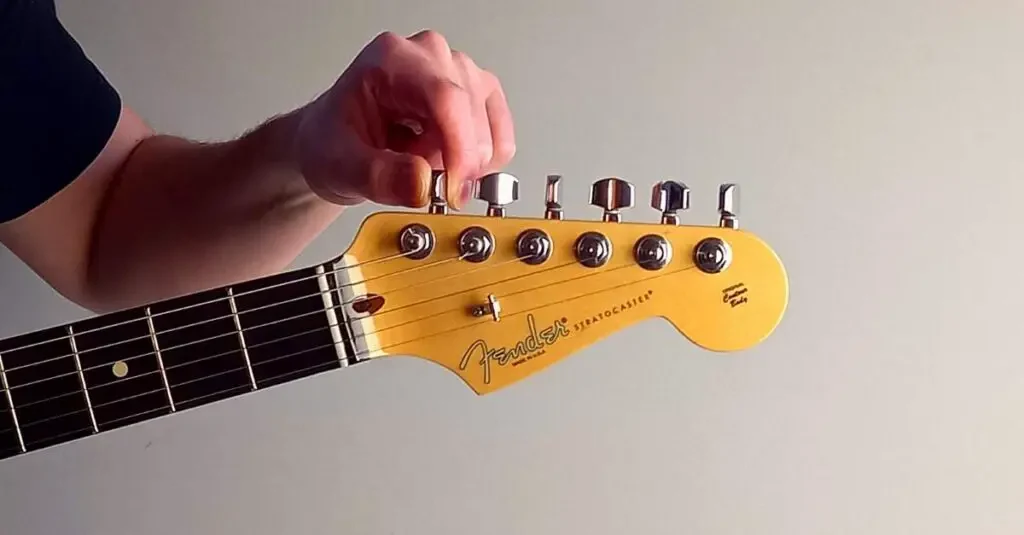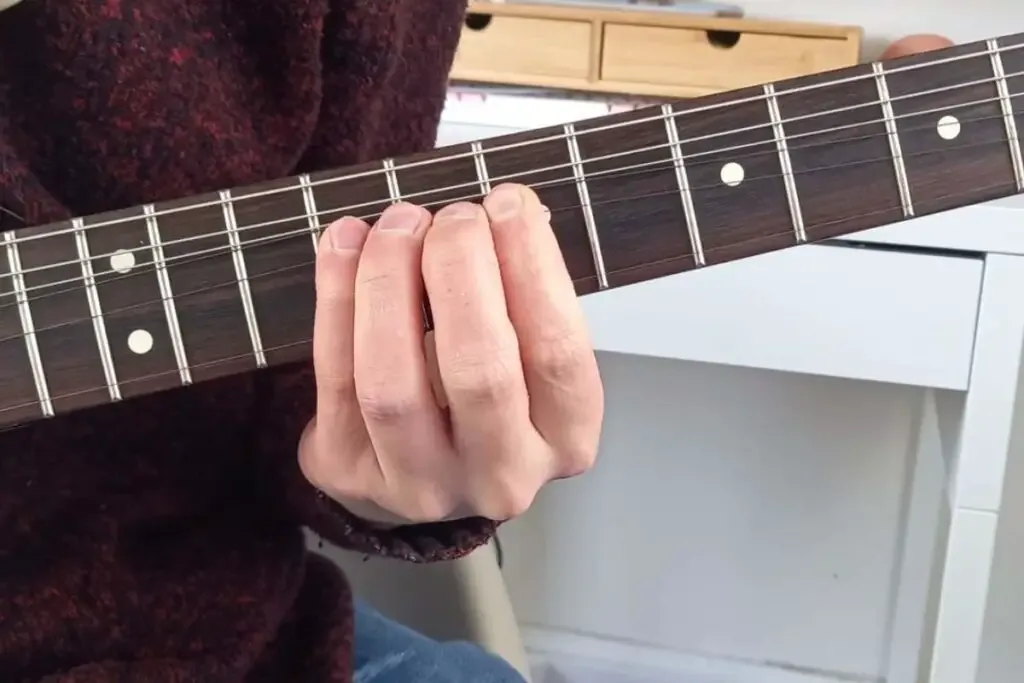Have you snapped a string on your favorite guitar? Perhaps you’ve accidentally mixed up the strings when restringing? Or maybe the strings on your favorite guitar are getting old… and there’s a spare guitar with a nice new set on it. Whatever your reason, you’re here because you want to know whether you can reuse guitar strings.
In most cases you can reuse guitar strings. As long as the string you want to use hasn’t snapped, and you’re putting it on a guitar with the same scale length or shorter. You’ll also want to make sure it’s the same string gauge, or similar.
But, there’s quite a few reasons that make it a bad idea to reuse guitar strings. I’ll explain why I don’t recommend reusing old strings in this article and give you some practical tips on what to do instead!
Can you reuse your old guitar strings?
There’s a number of reasons why you might want to reuse your guitar strings. If you’re on a tight budget and want to refresh your old set, or are in a hurry and want to swap one out from another guitar, the idea of reusing guitar strings can be tempting.
For me, I distinctly remember snapping the high e string on my favorite guitar when I was just getting started, and trying to replace it with a string from one of my other guitars. Back then, there wasn’t any online shopping with next-day delivery, so it would’ve meant waiting a week until I went to the local music store – an eternity for an eager guitarist!

Technically, you can reuse your guitar strings. As long as they’re in good condition and it was installed on a guitar with the same scale length or shorter – you’ll be fine.
But, just because you can doesn’t mean you should.
Why you shouldn’t reuse old guitar strings
Guitar strings degrade quickly over time. A combination of dirt, sweat, and stretching wears your guitar strings out, affecting its durability, how it sounds, and how it feels.. Sure, you can make your guitar strings last longer by cleaning them, but even then – they’ll eventually give out.
Personally, I really don’t recommend reusing your old guitar strings. There’s a lot that can go wrong with them, even if they’re relatively new.
Worse sound
99% of the time, an older guitar string will be in worse condition than a newer string. As I said, dirt, grime, rust, and stretching are all factors that happen to guitar strings as they age – and they all affect how your string sounds.
Firstly, older strings will have less sustain, and a duller sound. These tone-sucking strings will clip the wings of any soaring solo, and dampen even the most powerful riffs.
They’re also more likely to slip out of tune. As the string ages, it gets worse at holding tension, which means your tuning will fall flat after a while. Likewise, kinks in the string and deep rust can change the way the string vibrates, causing intonation problems (how in-tune the string is when you fret a note).

You might be able to get away with reusing newer strings, but even then – I’d just recommend picking up a new set instead. If you’ve broken a string and are looking to replace it – you can buy single strings! Much easier than messing around with old strings.
More likely to break
Picking, fretting, bending, tightening, loosening, hammer-ons, pull-offs… it’s fair to say that your strings deal with a lot during their brief lifetime.
Over time, the metal in your guitar string wears and becomes weak, making it more likely to snap – especially on your thinner strings.
But, even newer strings are at risk of breaking if you reuse them. When you wind your strings around the tuning posts, it creates weak points where the string bends. So, unwinding a string and then rewinding it on another guitar puts a lot of stress that can cause it to snap.
Harder to use
While guitar strings become weaker with age, they also become stronger. I don’t mean that they learn from the hardships and become better from the experience – I’m talking about work hardening.
Work hardening is when metal becomes more rigid after being bent a number of times. For your guitar strings, this means that they become tougher and harder to use. So, reusing an old string can mean bends become back-breaking, fretting more frightful, and strumming… also difficult.

Add on the grime and rust from the previous sections, and you end up with a tough, unresponsive, and brittle string.
At the end of the day, a new set of guitar strings will cost you less than $10. If you can afford it, just pick them up – or just replace the string you need!
Then, find out why your guitar strings are breaking and take steps to make them last longer to stop you from having to replace them as often.
What to do with your old guitar strings
Once your old strings are off your guitar, there’s not much you can do with them… or is there? While most of us would just call it a day and throw them in the trash, there are a few environmentally friendly – and creative – options for strings past their prime.
Recycle them
If you’re based in the USA, then you can take advantage of D’Addario’s PlayBack recycling program for guitar strings.
According to the site, around 1.5 million lbs of metal from instruments is put into landfill every year. That’s an unbelievable amount of waste.
While this service appears to be available in the USA at the moment, there are other schemes available worldwide. If you’re in the UK, like me, you can consider donating your strings to companies like The Guitar Wrist who turn your strings into jewelry, and donate the profits to charity. It’s a win-win for everyone.
If you’re looking to recycle them the traditional way, then you might be out of luck. Guitar strings aren’t readily recycled. I checked my local recycling guidelines (again, in the UK) and found that they’re not accepted in my household recycling waste!
Upcycle them
There’s a lot of creative things you can do with old guitar strings. Like the good people at The Guitar Wrist, you can make your old strings into jewelry. The tough but pliable metal makes a great choice for bracelets, necklaces, and even rings.
If you don’t feel like doing it yourself, try donating them to someone artsy in your life. I’m sure they’ll appreciate the free materials!
Another interesting tip I saw comes from UK guitarist Rabea Massaad (who in-turn got it from Nuno Bettencourt!). In his video (at around 10:04), Rabea talks about keeping old guitar strings from sentimental or milestone gigs.
This is a great idea! Maybe you’ve played your first gig, or maybe it’s your band’s last show – keeping your guitar strings as a keepsake can be a great way to remember important times in your life, and look back on them in later years. I can certainly think of some memorable shows that I’d like to have saved my strings from!
Boiling guitar strings
Before I finish up, I just wanted to touch on the idea of boiling your guitar strings. I’m not talking about making what I’m sure would be a very unpopular soup – I mean removing the dirt and grime off your strings by washing them in boiling water.
Over the years, this has been a common technique for bass guitarists to get more life out of their strings.
So, it’d stand to reason that you can do this with your guitar strings… right? Well, maybe. I honestly haven’t tried it. But, I don’t recommend it for guitar strings, for two main reasons.
- It doesn’t remove rust or deal with any of the structural problems with the string, and could even make it worse.
- Bass strings are pretty expensive (around 4x the price of guitar strings), so it makes sense for bassists to want to get more out of them!
If you want to give it a go, then be my guest! But, just make sure to be careful when dealing with any hot water!
Final thoughts
While it is possible to reuse guitar strings, I strongly advise against doing it. Even if it’s a relatively new string, it’ll still be weakened where it’s been wound around the post.
Instead, either pick up a new pack of strings – or a single replacement string (if the other strings are relatively new) and figure out what might be causing your strings to break.
Learning how to clean your guitar strings and store your guitar properly will do wonders in helping them last even longer.

Conor is a music producer, multi-instrumentalist, and all-round enthusiast from the UK with over 15 years of experience. He’s the founder and sole-content creator for the roundtable audio blog and YouTube channel.
